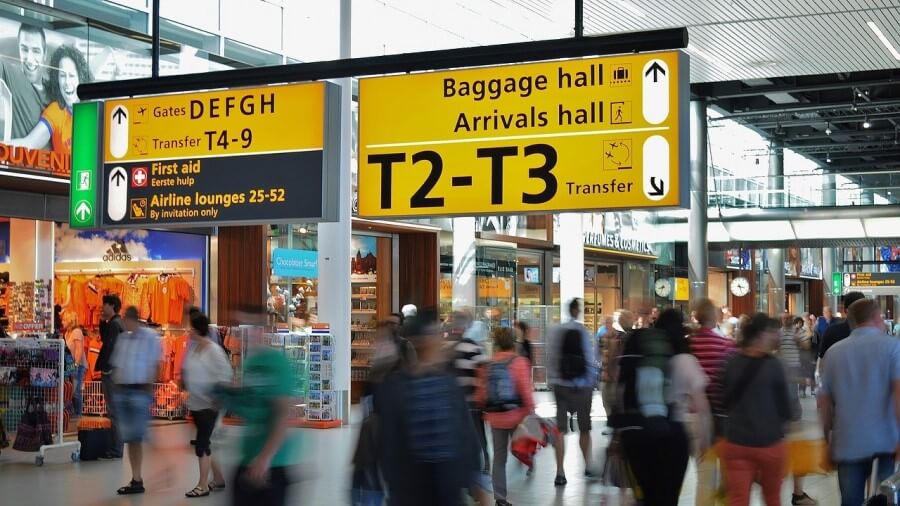 Professor Anne Green discusses how Brexit, recession and COVID-19 will impact immigration to the UK and create an unpredictable situation where some sectors and occupations may struggle to meet their labour and skills needs.
Professor Anne Green discusses how Brexit, recession and COVID-19 will impact immigration to the UK and create an unpredictable situation where some sectors and occupations may struggle to meet their labour and skills needs.
This is part two of a blog series on International Travel, Migration and Immigration. View the first blog.
Summary
Recession and the introduction of a new UK skills-based immigration system after the Brexit transition period, with equal treatment for EU and non-EU citizens, will impact on employers’ recruitment options and the future volume and profile of international migration flows. Coupled with the impact of COVID-19 it is difficult to predict precisely what future flows will look like but some sectors and occupations are likely to struggle to meet their labour and skills needs more than others. The manufacture of food and beverages, warehousing, accommodation and hospitality, other manufacturing and transport sector are amongst the sectors are amongst the most reliant on non-UK workers filling jobs with shorter training requirements for which provision is not made in the new skills-based immigration system. The reliance of the construction sector on self-employed workers also makes it vulnerable to immigration system changes.
Why do employers employ migrant workers from outside the UK?
Until the end of 2019, the UK and West Midlands labour markets were relatively tight. Employment of workers from outside the UK was one of a number of possible strategic and tactical responses to address labour and skills shortages – as outlined in the table below taken from a review commissioned by the Migration Advisory Committee on Employer decision-making around skill shortages, employee shortages and migration.
| Strategy | Measure |
| Adjusting rewards to workers | Raising wages |
| Raising/ adjusting fringe benefits | |
| Altering working conditions | |
| Numerical adjustments to labour supply | Recruiting young people |
| Delaying retirement of older workers | |
| Facilitating re-entry to the labour force | |
| Recruiting immigrants | |
| Use of non-standard employment practices – e.g. sub-contracting, temporary help | |
| Increasing output from existing workers | Increasing hours of work |
| Increasing intensity of work/ discretionary effort of existing personnel | |
| Improving the quality of existing labour supply | Education and training (to enhance human capital) |
| Importing skills | |
| Adopting alternative work organisation | Problem-solving teams, self-directed work groups |
| Automation | Substituting capital for labour |
Challenges in accessing suitable domestic labour have meant that employers look to migrant workers to address labour and skill shortages. To some degree recruitment of migrant labour may reflect the labour pool of applicants for vacancies. Where there is a lack of applicants, an employer may have little choice but to rely on recruitment of foreign workers – especially if there is an economy-wide shortage or (in some instances) a regional/local shortage. Moreover, migrants can be attractive to employers from an innovation perspective, in that they can bring new skills, capabilities and ideas to the organisations.
The relative ease of employing migrants can be a factor in their employment. If recruitment of migrant labour is relatively easy (as a result of the nature of the immigration system) an employer might be less inclined to consider (re)training domestic labour.
Network recruitment of migrant labour (i.e. where employees use their contacts to recruit further employees) tends to accentuate existing patterns of workforce composition leading to a concentration of migrant workers in particular sectors and occupations.
Free movement eases the employment of migrant workers from an employer perspective. In the West Midlands sectors which have become particularly reliant on free movement, as indicated by the share of the workforce accounted for by workers born in the European Economic Area (EEA) outside the UK are:
- Manufacture of food and beverages
- Warehousing
- Accommodation and hospitality
- Other manufacturing
- Transport
In the first two sectors workers born outside the UK accounted for approximately one in four workers according to an analysis of Annual Population Survey data for 2014-2016.
The impact of the COVID-19 pandemic
There is limited information available about the recruitment and employment of migrant workers since the COVID-19 pandemic. In Wave 17 (covering 19 October to 1 November) of the Business Impact of Coronavirus Survey businesses that had not permanently stopped trading were asked how the number of workers from within and outside the EU at their business had changed since the start of the COVID-19 pandemic. Across all industries, 2% of businesses had an increased number of workers from within the EU and 8% had a decreased number, since the start of the pandemic. The accommodation and food service activities industry and the administrative and support service activities industry had the highest percentages of businesses with a decreased number of workers from within the EU, at 19% and 12% respectively. Across all industries, less than 1% of businesses had an increased number of workers from outside the EU and 3% had a decreased number, since the start of the pandemic. The accommodation and food service activities industry and the administrative and support service activities industry had the highest percentages of businesses with a decreased number of workers from outside the EU, at 10% and 6% respectively.
 The UK immigration system before and after the Brexit transition period
The UK immigration system before and after the Brexit transition period
In the UK immigration system operational until the end of the Brexit transition period, there is an important distinction between EU and non-EU labour. The key features of the current UK labour immigration policy are:
- EU citizens coming to work in the UK are eligible to take up employment in any job – as a member of the EU the UK is not able to use any kind of Visa system to control migration from other EU member states
- Citizens of countries outside the EU are subject to immigration control (they do not have the right to enter the UK to live, work or study unless they are granted a visa)
Hence there is an important distinction between EU and non-EU labour. There has been an underlying assumption in current immigration policy that migrant workers from the EU can help in addressing skill shortages in the UK. For low-skilled jobs can play a role in addressing labour shortages/ providing flexible labour where there is an inadequate supply of UK labour.
At 23.00 hours on 31 December 2020, freedom of movement between the UK and the EU is due to end (unless there is a change to the timing of the end of the transition period). The post Brexit transition period immigration system marks the end of free movement and equal treatment of EU and non-EU citizens in a single skills-based points-based system (PBS). This marks a fundamental change in the UK immigration regime.
The key characteristics that each applicant has to meet (i.e. non-tradeable characteristics) in the PBS Skilled Worker route are a job offer from an approved sponsor (i.e. employer) at the required skill level (i.e. RQF (Regulated Qualifications Framework Level 3: A level or equivalent) and the ability to speak English. The job must be paid at least a general salary threshold of £25,600 or the going rate for the job, whichever is higher. Individuals earning between £20,480 and £25,599 may qualify under the PBS by ‘trading’ points on specific characteristics against salary (e.g. holding a PhD relevant to the job).
While the main emphasis is on the Skilled Worker route, there are other routes in the post-Brexit immigration system available for the highly skilled. These include:
- The Graduate route: to be launched in summer 2021. This is an unsponsored route (i.e. no employer sponsorship is required) providing international students with the opportunity to stay in the UK to work or to look for work after they graduate for up to 2 years (3 years for PhD holders).
- The Global Talent route: introduced in February 2020 is for talented and promising individuals in specific sectors wishing to work in the UK. These individuals neither need a sponsor nor to pass entry requirements (such as language tests and minimum salary thresholds).
- The Office for Talent: is a new cross-departmental body. Its role is to ensure that the UK’s talent offer is as strong as possible – for students and for established world leaders. Its role is to improve the effectiveness of the current immigration system.
There is no general route for migrant workers to fill low-skilled jobs (i.e. those requiring only short-term training) in the post-Brexit immigration system. The Government has cited the need to invest in staff retention, productivity and automation, rather than rely on new flows of migrant workers as had been possible under free movement. This means that to fill such jobs employers will be reliant on UK and Irish citizens, EU citizens who remain eligible to live and work in the UK and temporary, short-term visa schemes (such as the Youth Mobility Scheme). Estimates from IPPR indicate that more than four in five EU migrants working in the wholesale and retail, transport and storage, and hotels and restaurants would be ineligible for a skilled worker visa under the new immigration rules. Modelling by IPPR suggests that 63% of EU-born workers currently living in the UK (excluding the self-employed) would not be eligible for the skilled worker route in the new immigration system. In the absence of the COVID-19 crisis impact on international mobility, this would suggest a reduction in immigration. In turn, this would result in a workforce with an older age profile, given that the majority of migrants are relatively young.
 The construction sector is particularly exposed to changes in the immigration system given its greater than average reliance on self-employed workers. The new PBS has employer sponsorship as a central element and so does not offer a straightforward route to the UK for non-UK citizens. In turn, this may lead to labour and skills shortages for major construction projects that are part of economic recovery strategies.
The construction sector is particularly exposed to changes in the immigration system given its greater than average reliance on self-employed workers. The new PBS has employer sponsorship as a central element and so does not offer a straightforward route to the UK for non-UK citizens. In turn, this may lead to labour and skills shortages for major construction projects that are part of economic recovery strategies.
A seasonal workers scheme for agriculture remains in place.
EU, EEA or Swiss citizens living in the UK before 31 December 2020 and their families have until 30 June 2021 to make an application to the EU Settlement Scheme (EUSS) in order to secure their post-Brexit residence rights to continue living in the UK after that date. The EUSS makes a distinction between settled and pre-settled status. EU or EEA citizens who have lived in the UK for at least five years are eligible for ‘settled status’, which entitles them to live permanently in the UK and later apply for UK citizenship if they choose to. People living in the UK for less than five years are eligible for ‘pre-settled status’ and can apply for settled status once they reach five years of residence. Pre-settled status allows people to live, work and study in the UK although access to some benefits for economically inactive people is restricted. The default policy position is that EU or EEA citizens who do not secure their status through EUSS will lose their legal status in the UK.
Irish citizens are not required to apply to the EUSS: there is no plan to change current arrangements for Irish citizens to freely enter, live and work in the UK without requiring permission. There are no plans for immigration controls within the Common Travel Area covering the UK and Ireland, including on the Northern Ireland-Ireland land border.
Conclusion
The end of the Brexit transition period and a new UK immigration system means a marked change in the regulatory framework for international migration. While the intention is to make the UK attractive for skilled migrants, the new immigration system suggests a reduction in the labour pool of non-UK citizens to fill jobs at the lower end of the labour market where some sectors and occupations have had a strong reliance on EU labour.
As and when the economic outlook improves, the West Midlands may see migration to London in response to wage rises that may occur as a result of reduced availability of EU labour and given the importance of such labour in the London labour market.
Given the recession and the impacts of COVID-19 and Brexit considerable uncertainty prevails.
This blog was written by Anne Green, Professor of Regional Economic Development at City-REDI / WM REDI, University of Birmingham.
Disclaimer:
The views expressed in this analysis post are those of the authors and not necessarily those of City-REDI or the University of Birmingham.
To sign up to our blog mailing list, please click here.
